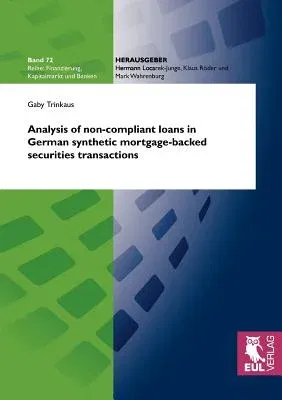Gaby Trinkaus
(Author)Analysis of non-compliant loans in German synthetic mortgage-backed securities transactions: Performance and regulatory effectsPaperback, 1 December 2010

Qty
1
Turbo
Ships in 2 - 3 days
In Stock
Free Delivery
Cash on Delivery
15 Days
Free Returns
Secure Checkout
Print Length
166 pages
Language
English
Publisher
Josef Eul Verlag Gmbh
Date Published
1 Dec 2010
ISBN-10
3899369904
ISBN-13
9783899369908
Description
Product Details
Author:
Book Format:
Paperback
Country of Origin:
US
Date Published:
1 December 2010
Dimensions:
21.01 x
14.81 x
0.89 cm
ISBN-10:
3899369904
ISBN-13:
9783899369908
Language:
English
Pages:
166
Publisher:
Weight:
204.12 gm

